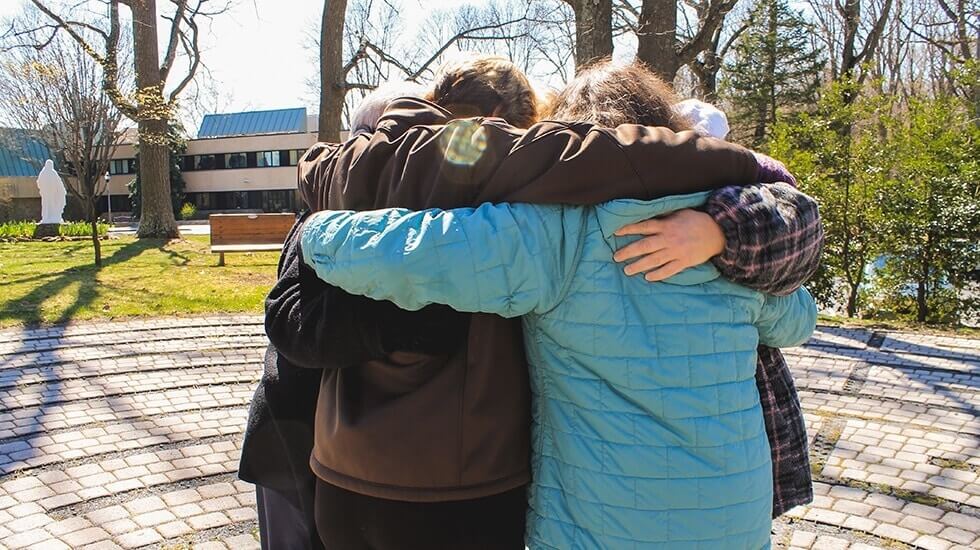


Editor’s Note: Last week we shared how NBCF provided a retreat for nine patients living with metastatic breast cancer—cancer that has spread beyond the breasts to other vital parts of the body. NBCF staffer, Rebecca, has written a blog series on what she learned from spending the weekend with these patients (and their female caregivers). This is the second in a four-part series.
A metastatic breast cancer diagnosis interrupts many of the ways a woman might traditionally be “there” for those she loves…and it also requires her loved ones to see their role of supporting her in a new light. While being there for one another looks different in a family touched by metastatic breast cancer, spending the weekend with this brave group of women taught me that we can redefine what it means to be present for our loved ones.
Listening
There are ways patients and their caregivers can be more present right now. Cathy and Diane, sisters who attended the metastatic retreat, learned to be present through listening. Between Cathy’s humor and Diane’s gentle strength, they share a sweet dynamic that almost makes you wish you could be their third sister. However, they strengthened their bond as Cathy learned to be more present for younger sister Diane, whose cancer has metastasized to her spine. Diane needed a sounding board to express sadness over missing future events in her children’s lives, but Cathy shared that she has always responded to these comments by “kicking her in the pants and telling her to live for today.” She intended to be encouraging, but these “pep talks” had the effect of making Diane feel censored, saying, “Everyone brushes me off when I comment about the things I’ll miss.” By taking time to really listen, Cathy learned that allowing Diane to process her feelings is just as important as encouraging her to have hope.
Writing
Diane’s sadness for missing her kids’ futures reflects one of the biggest challenges for patients with metastatic breast cancer; some of the moments they would like to be present for can’t happen yet—it’s not time. For this, Lillie Shockney, an expert in Patient Navigation and the organizer of this retreat, recommends patients write as a way to be present and instill values in their loved ones beyond death. There was hardly a dry eye in the room as Lillie shared the story of a 24-year-old woman who called to thank her for helping her mom remain present in her life, even though she was just 10 when her mother died. At Lillie’s urging, the patient had written cards for future milestones in her daughter’s life, including her recent wedding. That card included the words, “When your father lifts your veil and kisses your right cheek, you will feel me kissing your left.” She confirmed that her mother was present in spirit at that special moment. This same young woman also has a card for when she becomes pregnant, revealing how her mother felt about pregnancy, a card for the baby’s birth, recalling the wondrous feelings of her own daughter’s birth, and even a recording of her reading children’s books so that one day her grandchildren will know her voice. As a parent, I was, and am, struck by the profound ripple effect these retreats can have on helping future generations. While some patients feel this implies surrender to the disease, Lillie emphasized this is an effective way to maintain control. She has even written cards for her own grandchildren so that her love, wisdom and advice can always be remembered, even if she were to die unexpectedly in a car accident.
Planning
Another way patients can remain present is by communicating and documenting their financial/legal/medical desires, ensuring that loved ones know what the patient would have wanted. Kay, a retreat attendee who immigrated from Iraq over thirty years ago, said in her charming accent, “I tell my sons to just chill” (when they worry about her). However, she went on to say that one of the reasons she feels so peaceful about her condition is that her legal affairs are in order. During the retreat, patients were also invited to consider the legacy they might leave by donating their organs to medical research—a decision that might be difficult for a family member to make without knowing the patient’s wishes, especially given that certain organs and tissues need to be harvested very quickly after death.
These ways to be present—listening, writing, and planning—can be helpful to all of us, not just those facing a serious illness. However, if you or a loved one is facing metastatic breast cancer, consider answering this question: “Of everything that lies ahead, what scares you the most?” Retreat participants were blessed to have Lillie’s skill in facilitating discussion, along with a supportive environment and helpful resources as they answered this question candidly. However, you may want to enlist a trusted
friend, religious leader, or ideally a patient navigator, to help you
articulate your feelings…and to listen.
Thank you for being present with us on this journey to Restoring Hope. Next week we will explore how to find hope again after we have lost it.

Donations are always appreciated, but there are lots of great ways to get involved.

